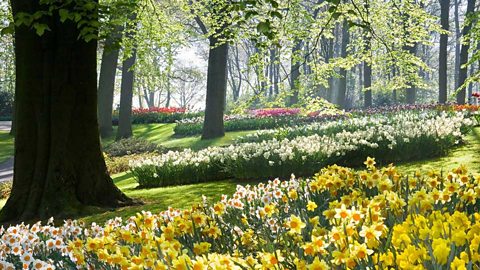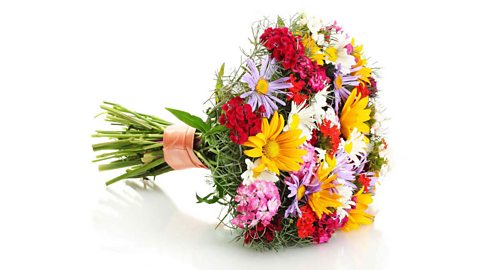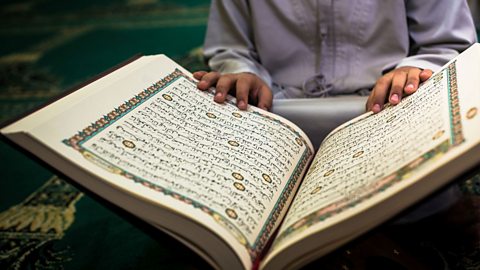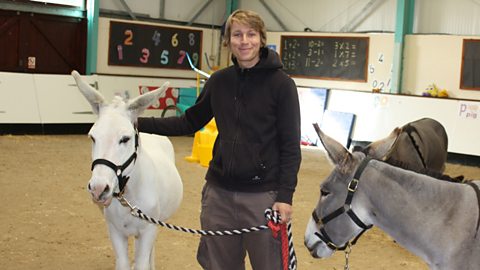Themes:
The signs and sounds of Spring; end of hibernation and new life of all sorts!
Before the programme
- Look together at the picture. How many signs of spring can you see?
- What do you love about springtime?
- How is spring different from winter? What changes in our world when spring comes?
- What signs of spring have the children noticed in the past few weeks? Leaves growing on trees? The days getting longer? Flowers like daffodils appearing? Nests in trees? Etc.
- What different animals or birds have you seen visiting your school? Do you have a ‚Äėwild area‚Äô where they can be seen more easily?
Programme content:
Welcome and introduction Ben introduces the programme and welcomes the children. He sets up the theme of Spring and new life.
Vox pops Children tell us about the signs of Spring which they’ve noticed.
Song ‚ÄėEverything is new‚Äô, Come and Praise Beginning, no 56. Encourage the children to join in as much as they can‚Ķ
Story Enough for everyone. An original story by Jan Payne. Read by Sue Brodie. The woodland world is waking up after a long, dark winter of hibernation. Everyone is hungry, but the greedy squirrels scoff all the food that has been left on the bird table. More food is put on the table, but not all the animals can get to it. So, Granddad Field Mouse puts on his bright red ‚Äėthinking cap‚Äô to think of a solution‚Ķ‚Äėfood parcels‚Äô for everyone! The food is distributed to all the animals and there is enough for everyone‚Ķ
Reflection The changes in Springtime. Ensure everyone is listening carefully.
Opportunity for prayer Thanking God for the joy of Christmas. The children can make the prayer their own by joining in with ‚ÄėAmen‚Äô at the end.
After the programme:
Talk about the story
- How do you think the animals felt about the arrival of Spring?
- Why do you think the squirrels were so greedy? What would you say to them if you were one of the other animals?
- Why do you think Granddad Field Mouse was so very wise?
- Would you like a ‚Äėthinking cap‚Äô like Granddad Field Mouse had? What great ideas might you think up?
- How did the Field Mouse family show care for all the animals in the garden, and how was the whole family involved? Have you ever done something all together as a family for someone else? What?
- Do you think it was fair that the squirrels weren’t provided for in the field mouse family’s food parcels?
Follow-up activities:
- Listen again to the song ‚Äď how many signs of Spring can you spot?
- In drama / dance, re-enact being a bulb beginning to grow, perhaps to some Springtime music such as ‚ÄėSpring‚Äô from Vivaldi‚Äôs ‚ÄėFour Seasons‚Äô.
- Go out into your school grounds on a Springtime walk, spotting signs that Spring is here. Take sketchbooks and draw what you see, then use the sketches to make a class book about Spring.
- Watch your school grounds carefully for signs of wildlife ‚Äď maybe use data handling to help you keep track of what‚Äôs spotted and when. ‚ÄĘ Make an animal alphabet like Granddad Field Mouse did ‚Äď or think of your own categories for a challenge! How fast can your group get from A-Z?
- Find out about the wildlife we have in Britain, perhaps using the ¬ť∂Ļ‘ľŇń Springwatch website. Which animals hibernate, and which do not? Which animals do you find most fascinating? Why?
Click to display the image full size

KS1. Mothering Sunday. audio
We hear from some school children about why they think their mums are special and how they are going to celebrate Mothering Sunday!

KS1. Ramadan and Eid. audio
Finding out about the holy month of Ramadan and the festival of Eid-ul-Fitr which ends it

KS1. Palm Sunday - The Donkey's tale. audio
Ben Faulks visits a donkey sanctuary and considers the Easter festival and the special journey made by one donkey at Easter.
